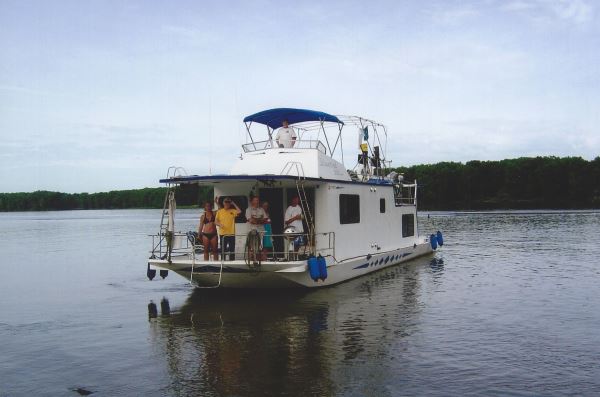
Taking a river trip for a week or two has been a long-standing tradition for Mississippi River boaters. The number of people currently doing it has declined, but three friends from Princeton, Iowa remain dedicated to the tradition and maintain that a two-week houseboat trip is the best getaway there is. So good, in fact, that they have been taking trips almost every year since 1998.
The trio includes Rick and Darlene Suiter, owners of Diamond Blue, and their good friend John Nelson. They also take Sophie, Suiter's Cockapoo. The boat is a 1979, 53-foot Stardust they rebuilt specifically for traveling and that extensive effort was profiled by this magazine in May of 2005. Prior to the rebuild, they purposely sunk it so they wouldn't lose it in a flood. Then Rick cut the cabin off with a chainsaw so he could start with a bare hull.
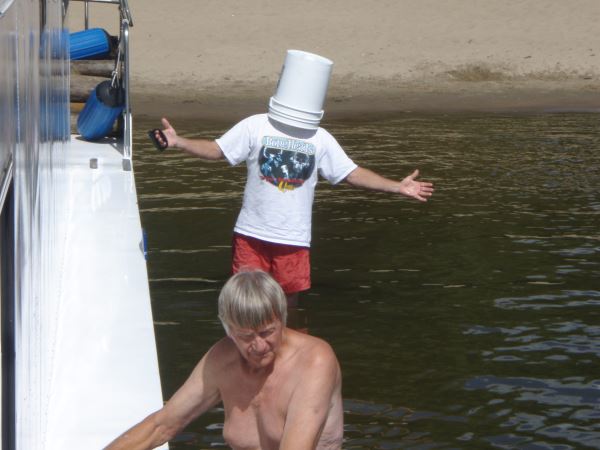 Earlier he had completely rebuilt a 1975, 47-foot Matticraft to be 'liveaboard friendly' and that was featured in the February 2000 issue of Houseboat magazine.
Earlier he had completely rebuilt a 1975, 47-foot Matticraft to be 'liveaboard friendly' and that was featured in the February 2000 issue of Houseboat magazine.
On the Stardust, Rick, a retired iron worker, focused on the general construction while John, a retired builder and woodworker, crafted all the interior cabinetry. He used lightweight butternut locally harvested to keep the weight down and even crafted foam-core counters. He traded his labor for a lifetime of being able to use the boat.
Darlene, who is retired from the insurance industry, managed the finances and made sure the boat had the essentials she wanted.
Besides trimming the boat's weight, there were several other design goals. A major criteria was a minimum draft for easier beaching and navigating low water. The hull has a very shallow V with an aft keel that Rick extended forward so it would dig into a beach for stability. Twin 305hp engines are connected to heavy-duty outdrives spinning 20-inch props and with the drives up, it only draws 14 inches.
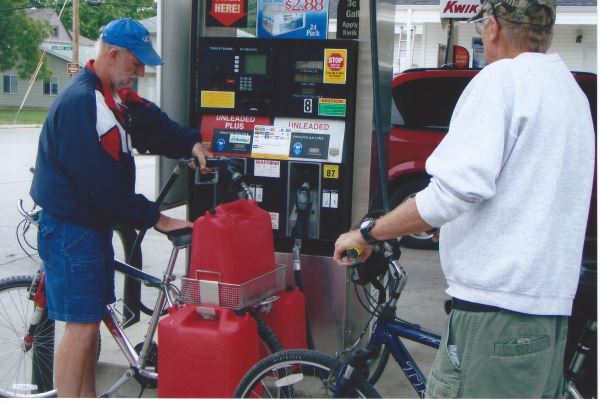 It has three, 33-gallon water tanks, a 200-gallon fuel tank and a 150-gallon holding tank. These, like many of the boat's components, are re-purposed but high quality products.
It has three, 33-gallon water tanks, a 200-gallon fuel tank and a 150-gallon holding tank. These, like many of the boat's components, are re-purposed but high quality products.
Last summer's trip from their home port upstream to Wabasha, Minn., was a total of 530 miles over 18 days. Running around 8 mph and averaging a few hours a day, they burned just under 400 gallons of fuel at a cost of $1,410.24. John says he spent more on a recent four-day trip to Colorado than he did on the river trip.
They managed that by buying a minimal amount of marina fuel only when they needed to pump out and take on water. Instead, they tied to city docks and shuttled five-gallon gas cans on their bicycles to nearby gas stations. The bikes are also used for grocery getting, exploring and trips to favorite places like a pawn store in one town.
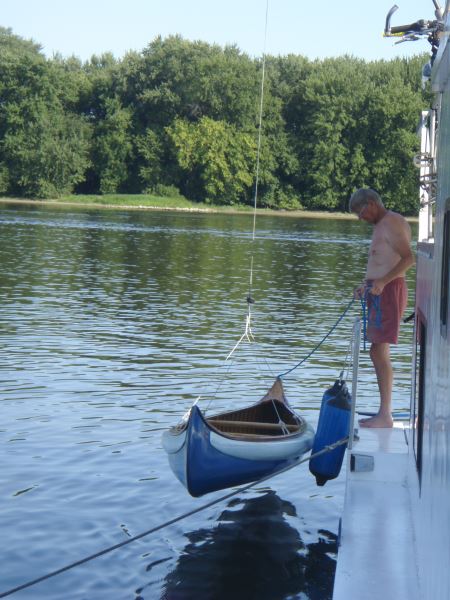 For exploring the river and for fishing, they have always carried a 1942 Old Town Canoe. Originally canvas and cedar, Rick rebuilt it to epoxy-coated cedar, then fabricated a jib crane to launch it.
For exploring the river and for fishing, they have always carried a 1942 Old Town Canoe. Originally canvas and cedar, Rick rebuilt it to epoxy-coated cedar, then fabricated a jib crane to launch it.
Their basic travel plan is to have a completely flexible agenda. Over the years they have marked and graded the beaches on their river charts and have developed favorite places to stop. But beaches sometimes degrade and new ones appear so between that, the weather, what they feel like doing, how long they want to stay in one spot and time for exploring or maintenance work, they poke along as the mood strikes them.
They generally stop in the mid-to-late afternoon, but if a beach they had in mind is dirty, crowded or simply not to their liking, they move on. If it is dark by dinner time, they simply use a headlamp while grilling.
Their beach rating system includes several factors topped by water depth and sand quality. Beaches generally get deeper, cleaner and have more constant water levels the farther downstream they are from a dam. They are usually deeper on the upstream end. They try not to get too close to railroad tracks and avoid beaches accessible by car. They won't stay overnight in the sandy lagoons the United States Army Corps of Engineers create as dredge disposal sites because they are too busy, too noisy and have poor air flow.
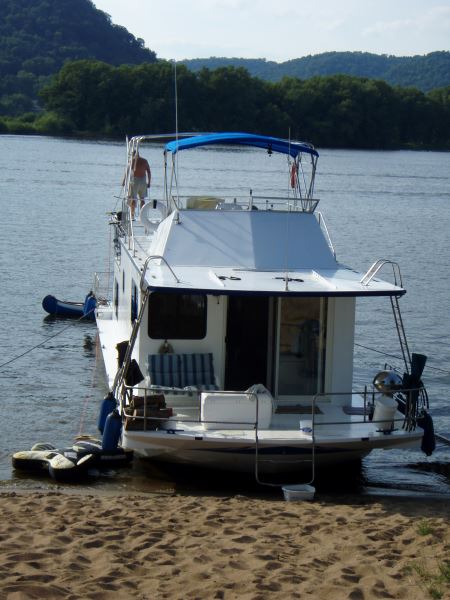 Because of the river current and wakes from tows and other boats, they power onto the beach as far as they can, then set upstream and downstream lightweight aluminum anchors Rick fabricated. They only use a center anchor if a storm is predicted.
Because of the river current and wakes from tows and other boats, they power onto the beach as far as they can, then set upstream and downstream lightweight aluminum anchors Rick fabricated. They only use a center anchor if a storm is predicted.
Once tied in they usually go for a swim, jump, or do flips off the upper deck, and walk to the upper end of the beach and float downstream, partially to check the water depths along the way. Bathing with Dawn dish soap, their all-purpose cleaner, is part of the routine.
For access to the boat, there is a large ladder that slides out under the swim platform and a custom center section of the front rail that swings down to become a boarding ladder.
Sophie has her own 12-inch by 8-foot boarding ladder on the side of the front deck. That lets her clean her feet well enough that “she gets most of the sand off,” according to Darlene.
John builds and flies electric radio-controlled planes and brings along a couple of his amphibious airplanes and gliders so he may fly one of those. He also flies them alongside the boat while they travel.
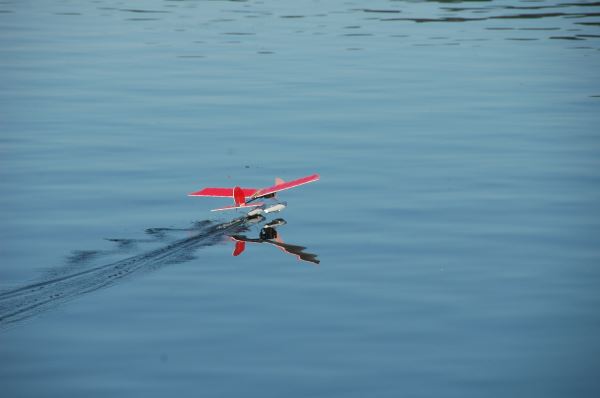 They found an unusual use for one of his planes last summer when the cabin's temperature climbed into the high 80s. He fired up the plane and used the prop wash as a fan.
They found an unusual use for one of his planes last summer when the cabin's temperature climbed into the high 80s. He fired up the plane and used the prop wash as a fan.
They like beaches for a variety of reasons.
“You can only go so fast for so long and you can only drink so much beer, but you can sit and watch people all day long,” says Rick.
They also run into interesting situations while beaching, like when a Corps of Engineers dredge crew set up their equipment right next to them. It was impressive, they say, as the 20-plus crew members assembled and joined 500-foot long, 22-inch diameter pipe sections into a huge snake that deposited the dredged material from a sharp bend in the river to a location about one-half mile away. Monitoring the crew's communication added to the experience.
Eventually the commotion got too much so they moved further away, but still in observation range.
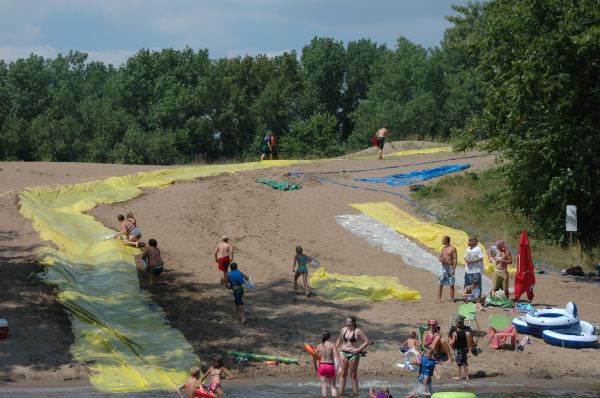 They also stayed on a beach where locals had constructed a water slide on top of a sand dike. They had dug a furrow in the top, lined it with plastic, then pumped water to the top so they could slide down on donut tubes. Rick said it was a blast.
They also stayed on a beach where locals had constructed a water slide on top of a sand dike. They had dug a furrow in the top, lined it with plastic, then pumped water to the top so they could slide down on donut tubes. Rick said it was a blast.
Occasional maintenance issues are part of river trippin'. One lock they went through was so loaded with weeds that an engine intake got plugged and caused the engine to overheat and shut down. They limped out of the lock on the other engine but then that one also died. They anchored until the engines cooled and re-started, then moved away from the lock before Rick dove under the boat to clear the intakes.
While beaching on another trip they accidentally drifted down over a wing dam—submerged rock piles that jut out perpendicular to the shore—and the drives got hung up on it. Getting off was enough of an intense, harrowing experience that Darlene demanded to be taken to a marina.
While there, Rick realized they were taking on water and after pumping and inspecting found that a quarter-inch plug had been knocked out of the keel. So John calmly whittled a plug from pressurized wood, Rick tapped it in and the problem was solved. Two years later Rick realized the plug was still there. They say that is one of the few times they have stayed in a marina.
Rick ducks into the engine room a couple times a day.
 “I like working on the boat while we are out there,” he says.
“I like working on the boat while we are out there,” he says.
Knowing “stuff happens,” they carry a supply of spare parts including a starter, carburetor kit, spark plugs, belts, impellers and a water pump.
Darlene handles the food preparation, then they all share cooking and clean-up chores. At night they sometimes make a fire on the beach. It is a treat when one of the large excursion boats slides by, lighting up the night.
They have learned that if you “moon” a passing tow, your boat will get lit up all night by the powerful spotlights from other tows as the pilots pass along word of your actions.
Evenings frequently end with a domino game with the bragging rights' results carefully recorded in their daily log. They might listen to one of John's audio books while enjoying ice cream or popcorn popped in a stove-top, hand-cranked popper.
“Every boat needs a WHIRLEY POP,” asserts Rick.
Mornings are leisurely, big-breakfast affairs before they mosey on.
In addition to their logs and numerous photo albums, they keep a special “River Life” scrapbook that highlights some of the more unusual things, places and people they have run across.
It includes pictures they took under the I-35W Saint Anthony Falls Bridge in Minneapolis just a couple days before it collapsed. They think those may be the last pictures ever taken from that angle.
There are photos from the time they were awakened in the middle of the night by the derailment of three engines and five railroad cars. A huge boulder had broken free, rolled down a hill and dislodged part of the tracks just above the beach where they were staying.
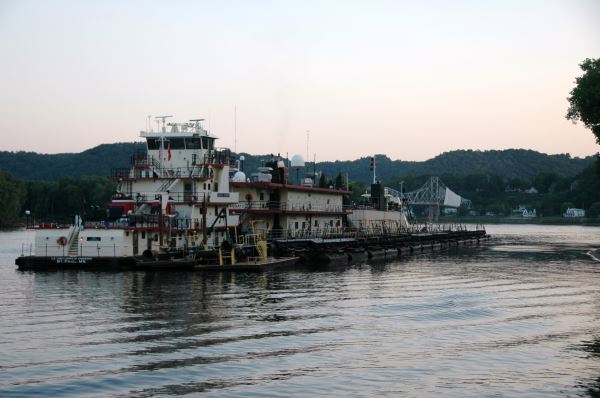 They have photos of a cleverly designed portable drink blender that used a weed-eater motor for power, for use on a beach.
They have photos of a cleverly designed portable drink blender that used a weed-eater motor for power, for use on a beach.
Also included are a number of pictures of the unusual, homemade vessels they have seen floating down the river.
These three people have long had deep connections to the river and to houseboats. Combining these two favorite things lets them enjoy their favorite kind of relaxing and enjoyable summer vacations.
Rick sums it up best, “If you are a river person, you just have to spend time there.”